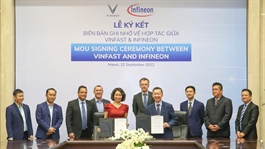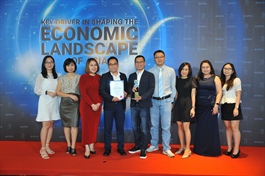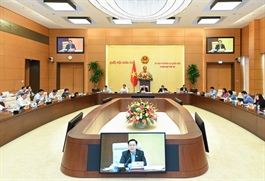Why Singapore and Vietnam together mean business
Why Singapore and Vietnam together mean business
At first glance, there may appear to be few similarities between the economies of Vietnam and Singapore. One is a leading exporter of consumer electronics, textiles, and footwear while the other is a global hub for shipping, technology, and financial services. Yet, like many successful partnerships, strong potential synergies exist.
One key area for cooperation is digitalisation. In February, Vietnamese State President Nguyen Xuan Phuc visited Singapore as his first overseas stop of the year. Close to 30 MoU between businesses from both countries were signed. Worth almost $11 billion, many were in the field of technology.
Vietnam’s forward-looking ambitions are noteworthy. Aspiring to be a high-income economy by 2045, the nation’s digital economy is set to account for 20 per cent of its national GDP, thanks to its ambitious digital transformation plan. Milestones to achieve by 2025 include 80 per cent of online public services to become mobile friendly, and 80 per cent of households with fibre optic broadband (compared to about 55 per cent in 2020).
Collaborating for growth
Singapore could play a major role in supporting this journey. The Lion City’s technology companies, such as Singtel and ST Telemedia are highly advanced, with many commanding an overseas presence throughout Asia, Europe, and North America.
The city-state can assist with the development of digital infrastructure, from data centres that store and manage digital assets to networks connecting people and businesses online. Singapore companies can also help nurture Vietnam’s talent pool, especially in roles involving science, technology, engineering, and mathematics, and instil good governance in talent management. In return, the digitally savvy workforce can add competitive advantage for Singapore businesses operating in Vietnam.
At the same time, Vietnam’s increasingly skilled workforce can help advance the nation’s manufacturing transformation, supporting Singapore manufacturers and retailers’ supply chains diversification. This will help ease the impact of disruptions brought about by the global pandemic and prolonged lockdowns.
Purposeful partners
Another area of potential partnership is sustainability. At the COP26 in 2021 in Glasgow, Vietnam pledged to become net zero by 2050. Likewise, Singapore has since announced its intention to be net zero by or around the same time. Towards this ambition, the Vietnamese government has undertaken many measures. Employing a whole-of-government approach to promote the interaction between ministries and adopting a legal and governance framework that encourages foreign and domestic private investments in the green economy and sustainable development will be instrumental.
One such policy is Vietnam’s National Green Growth Strategy for the 2021-2030 period, which sets out to accelerate economic prosperity, environmental sustainability, and social equality. The strategy strives to reduce greenhouse gas emissions per GDP by at least 15 and 30 per cent by 2030 and 2050, respectively as compared to 2014 levels. It also aspires to increase renewable energy’s mix in Vietnam’s total primary energy supply to up to 20 per cent.
Singapore has built world-class infrastructure, and is renowned for robust urban planning. It is a global sustainable financial centre and a fintech hub, whose efforts to bring down the cost of providing financial services could help Vietnam, as it strives to become more financially inclusive, especially in rural areas.
Inclusive green growth requires ready access to green financing. In Vietnam, Standard Chartered is raising capital on behalf of companies through green bonds and providing credit facilities to incentivise borrowers to reduce their carbon footprint – as well as offering individuals green mortgage loans and carbon-neutral debit and credit cards. Vietnam has the potential to become a leader in renewables, given its comprehensive installed solar power capacity and abundant wind resources. The nation’s political will and market incentives could offer valuable lessons to other ASEAN countries in their just transition journey.
Supporting a resilient future
For Vietnam’s digitalisation and sustainability agendas to succeed, financing will of course be a non-negotiable prerequisite. According to the United Nations, there is a global shortfall of $100 trillion in funding sustainable development. And that is why at Standard Chartered we continue to work with governments and businesses to support sustainable economic growth and boost financial inclusion through digital solutions.
One such solution is Solv, a technology platform for micro, small, and medium enterprises that is designed to help small businesses digitalise their commerce and lending journeys. Standard Chartered has launched Solv in India and Kenya and plans to unveil the solution in Southeast Asia to support the region’s underserved.
A close partnership between Singapore and Vietnam will enable the two countries to further capitalise on the wealth of opportunities that digitalisation and sustainability offer. This should not only spur growth and prosperity for both nations but also foster greater interconnectivity and prosperity for the whole of ASEAN.

























